Drinking Fluids
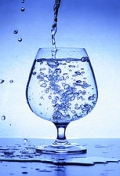
Water is a vital nutrient and one that we cannot store in the body. We lose water all the time through sweat, urination, defecation and simply exhaling water vapour. It is essential to drink a minimum of 1.5 litres / 2 1/2 pints of water a day, preferably 2 litres/ 3 1/2 pints. As we grow older our thirst mechanism becomes less reliable and we are more prone to dehydration.
Water – The Healthiest Drink The best drink to keep the body hydrated is pure water. Fruit and vegetable juice and herbal teas are also good choices. Soft drinks that contain flavouring, preservatives and sugar can place stress on the body or add ’empty calories’ to your diet and should be drunk infrequently. If your diet is very high in fibre, you will need to drink extra water (fibre absorbs water in the intestines). Carbonated water is an acceptable alternative to still water, but it should be drunk in moderation, as dietary therapists believe it raises the pH of the stomach and the reduced acidity makes it harder for the body to digest protein. Apart from preventing dehydration, keeping up your fluid intake may help to prevent bladder cancer as you get older. This maybe because a regular flow of fluid prevents prolonged exposure of the bladder tissue to potential carcinogens. Drinking water is also good for your appearance if your skin is properly hydrated it will look younger and healthier.
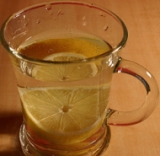
Don’t Rely On Thirst:
As you grow older you should not rely on feeling thirsty to tell you when to drink. Instead, drink water throughout the day and monitor the color of your urine. A pale golden color means that you are probably getting enough to drink; dark amber means that you are not. Dehydration can be exacerbated by hot climates, exercise, alcohol, illness (especially vomiting and diarrhea), and taking diuretic medication. Most people do not drink enough fluid on a daily basis to keep the body fully hydrated, or they drink too many diuretic drinks, such as coffee, which increase the body’s fluid loss. As a result, many of us suffer from symptoms of mild dehydration such as fatigue and headaches, and the body functions at a sub-optimum level. If you become seriously dehydrated, your skin becomes dry, your eyes appear sunken, your urine turns dark and you may suffer from constipation, dizziness, nausea, cramps, confusion, low blood pressure and itchiness.
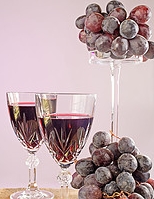
Alcohol:
As you get older, alcohol can take its toll on the body. Drinking more than recommended guidelines places stress on the liver, hinders the absorption of nutrients, dehydrates the body, damages cells and causes the body to age prematurely. This is especially noticeable in the skin. Yet if alcohol is drunk in moderation, it can offer some benefits. Half to one unit per day for women and two units for men may help to reduce arterial aging and heart attacks. Scientists are not entirely certain how alcohol produces these beneficial effects, but some believe that it may prevent fat from oxidizing and forming deposits on artery walls. Red wine may be beneficial if drunk in moderation. The flavonoids in red grape skins are thought to have antioxidant properties. Antioxidants help to prevent disease and the degeneration of body cells.
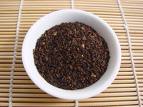
Caffeinated Drinks:
Some of our most popular drinks, such as tea, coffee and cola drinks, contain caffeine. Apart from its diuretic effect, opinions are mixed about whether caffeine constitutes a threat to health. It is therefore advisable to drink caffeinated drinks in moderation (no more than 2 or 3 cups a day). Overuse may cause sleep disturbances, prevent vitamins and minerals from being used effectively by the body, raise blood pressure and cause an increase in the secretion of stress hormones. Different types of coffee contain different amounts of caffeine; ground, unfiltered coffee contains the most. A good alternative is steamed decaffeinated coffee, which unlike other decaffeination processes does not involve the addition of toxin chemicals. For a healthier alternative try dandelion coffee or a cereal beverage made with barley and chicory.
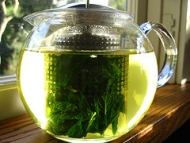
Herbal Teas:
A great variety of herbal teas are available, and you can even make your own herbal infusions with medicinal benefits. Herbal teas have the benefit of hydrating the body while being caffeine free. To make a cup of chamomile tea, place a handful of the fresh herb in a teapot, pour boiling water, leave to infuse for 5 minutes, stir and pour through a strainer. Chamomile can help to relieve anxiety and insomnia.
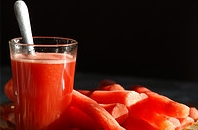
How To Stay Hydrated:
- Eat foods with high water content such as fruit and soup.
- Drink a glass of water as soon as you get up in the morning.
- Drink a glass of water at least half-an-hour before each meal.
- Sip water at 10-15 minute intervals during exercise (many people underestimate how much they sweat; try weighing yourself before and after you sweat).
- Drink water at the first sign of a headache or muscle cramp.
- Choose low-caffeine or decaffeinated drinks that will not have a diuretic effect on the body.
- Buy a juicer and make your own fruit and vegetable juice. Alternatively, make fruit smoothies in a blender.